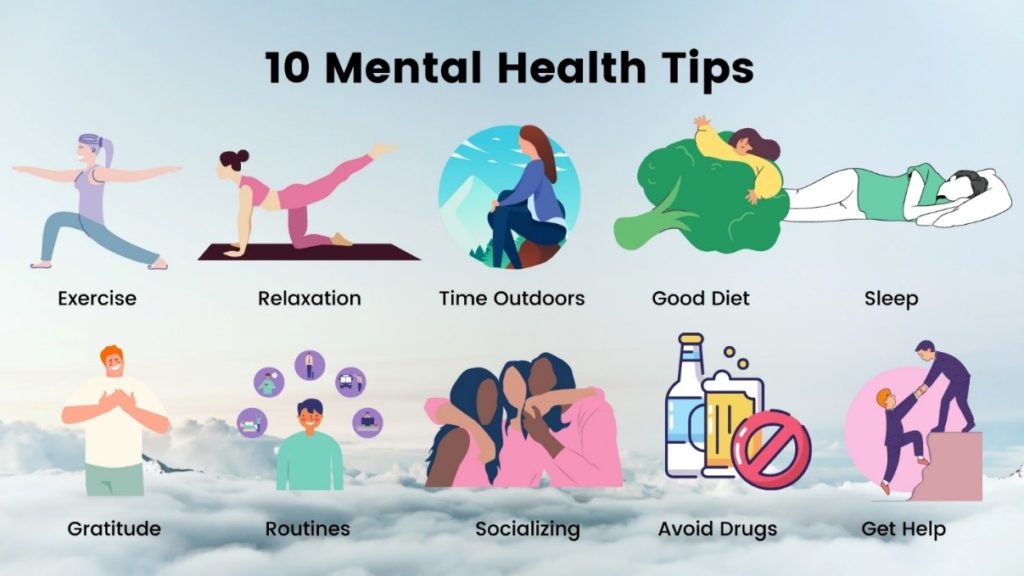As the year comes to an end, it’s important to take time to check in with yourself, reflect and set tangible goals for the year ahead. When setting these goals, don’t forget about your mental health.
As you look at the graphic below, reflect on a few key areas you’d like to improve in. Whether it’s exercise, creating more positive routines, socializing or expressing gratitude, setting mental health goals can help you start 2022 feeling like your very best self.

Now that you have your goals in mind, let’s focus on how to tackle them. Below are 10 tips from Brain Center TMS that will help you proactively improve your mental health.
- Exercise Regularly
Exercise is medicine. Because exercising allows your body to release feel-good endorphins and improves blood circulation to your brain, exercise has many mental health benefits. However, if exercising feels overwhelming to you, don’t be afraid to start slow! You can begin with walks around your neighborhood, bodyweight exercises, yoga, Pilates or even light stretching. Just simply move your body for at least 10 minutes a day, and progress from there.
- Incorporate Relaxation Techniques
Stress relief should be a preventative task! By incorporating regular relaxation techniques, like deep breathing, yoga, drawing, mindful lettering or using fidget toys, you can better keep stress under control before it becomes a problem. Consider prescheduling some self-care days on your 2022 calendar. Think spa day, massage, yoga classes, painting, etc.
- Spend Time Outdoors
Studies suggest that people who spend adequate time outdoors have better memories, lower their risk of significant psychiatric disorders, have less anxiety and stress and are more attentive, among other things. However, most of us spend the majority of our days cooped up inside. Make it a priority to get outside, soak up the natural sunlight and listen to the sounds and sights of nature regularly. Doing this is an easy way to improve your mood.
- Improve Your Nutrition
In a way, you are what you eat because your diet can directly affect your mental health! Eating too much (especially processed, high-sugar foods) or not eating enough can cause you to feel lousy and contribute to mental health struggles. In addition, many people who struggle with mental health lack vitamin D, vitamin B, and omega-3 fatty acids. Make sure that you’re incorporating these things into your diet and drinking plenty of water to keep your brain happy. If you’re unsure what you should be eating, reach out to a nutritionist to help get you on the right track.
- Get Plenty of Sleep
Sleep has a huge impact on mental and physical health. Not getting enough sleep perpetuates the stress cycle and causes you to feel fatigued, anxious and moodier than normal. Prolonged sleepless nights can even contribute to cognitive impairment and physical health problems. Improve your sleep hygiene by setting a consistent bedtime schedule seven days a week and sticking to it. Other ways to improve your sleep include avoiding electronics prior to bedtime, creating a cool-temperature sleep sanctuary, using sound machines and black out curtains and avoiding large meals or alcohol before bed.
- Express Gratitude
Practicing gratitude reminds us of everything going right instead of dwelling on everything that is going wrong or could go wrong. Expressing gratitude regularly helps to rewire our brains to see the positive. Start by writing down one thing each day that you are grateful for. You can put this in a journal or write it on a strip of paper to collect in a jar. At the end of the year, reflect on everything you wrote down! Take it a step further by expressing gratitude to those around you.
- Establish Routines
When you get your brain into “routine mode,” it’s easier to stay motivated. Take a moment to write down your ideal weekly or daily routine using bulleted lists or checkboxes. This could include exercise, nutrition or other self-care tasks. When you complete something, check it off for even more motivation! If you find it difficult to stick to a routine at first, don’t be hard on yourself. Start small, do your best and give yourself grace when you need a break.
- Socialize With Friends
Self-isolation can make mental health struggles feel even worse. Make an effort to get in contact with friends and family members when you’re feeling low. Socializing regularly and feeling like part of a group will make you feel better and improve your mental health overall. Don’t be afraid to talk about your struggles with others. Consider that they may be going through something similar!
If you don’t have access to your friends when you need them, consider joining a group. This can be a fitness class, a club or even a volunteer group that will link you up with other people.
- Limit Alcohol Use
While the occasional social drink is no big deal for most people, alcohol use can make mental health struggles worse. Try to limit your alcohol use to only when socializing with friends instead of when you’re alone. If you feel as though you’re relying on alcohol to maintain a good mood, it’s time to cut back.
- Seek Treatment
There is no shame in seeking treatment if you’re struggling. In fact, it’s one of the bravest things you can do. By talking to a friend, family member, counselor or mental health professional about what you’re going through, you can help end the stigma around mental health issues and get back to feeling your best sooner. Even brief mental health treatment can make a big difference.
Improving your mental health is not always easy, but it is possible. How can you use these 10 tips to embrace your best self in 2022?
by Megan McKee

